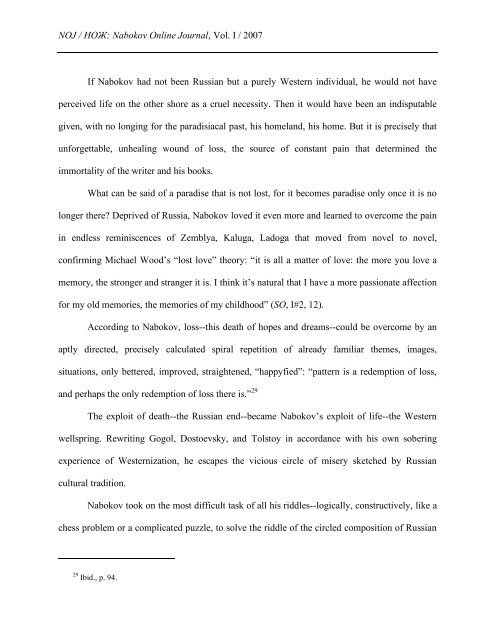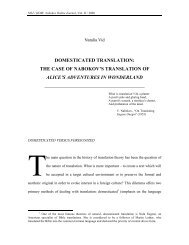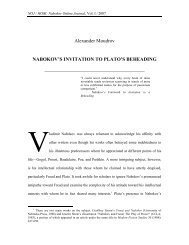Nina L. Khrushcheva DEATH IS BUT A QUESTION OF STYLE 1
Nina L. Khrushcheva DEATH IS BUT A QUESTION OF STYLE 1
Nina L. Khrushcheva DEATH IS BUT A QUESTION OF STYLE 1
You also want an ePaper? Increase the reach of your titles
YUMPU automatically turns print PDFs into web optimized ePapers that Google loves.
NOJ / НОЖ: Nabokov Online Journal, Vol. I / 2007<br />
If Nabokov had not been Russian but a purely Western individual, he would not have<br />
perceived life on the other shore as a cruel necessity. Then it would have been an indisputable<br />
given, with no longing for the paradisiacal past, his homeland, his home. But it is precisely that<br />
unforgettable, unhealing wound of loss, the source of constant pain that determined the<br />
immortality of the writer and his books.<br />
What can be said of a paradise that is not lost, for it becomes paradise only once it is no<br />
longer there? Deprived of Russia, Nabokov loved it even more and learned to overcome the pain<br />
in endless reminiscences of Zemblya, Kaluga, Ladoga that moved from novel to novel,<br />
confirming Michael Wood’s “lost love” theory: “it is all a matter of love: the more you love a<br />
memory, the stronger and stranger it is. I think it’s natural that I have a more passionate affection<br />
for my old memories, the memories of my childhood” (SO, I#2, 12).<br />
According to Nabokov, loss--this death of hopes and dreams--could be overcome by an<br />
aptly directed, precisely calculated spiral repetition of already familiar themes, images,<br />
situations, only bettered, improved, straightened, “happyfied”: “pattern is a redemption of loss,<br />
and perhaps the only redemption of loss there is.” 29<br />
The exploit of death--the Russian end--became Nabokov’s exploit of life--the Western<br />
wellspring. Rewriting Gogol, Dostoevsky, and Tolstoy in accordance with his own sobering<br />
experience of Westernization, he escapes the vicious circle of misery sketched by Russian<br />
cultural tradition.<br />
Nabokov took on the most difficult task of all his riddles--logically, constructively, like a<br />
chess problem or a complicated puzzle, to solve the riddle of the circled composition of Russian<br />
29 Ibid., p. 94.
















